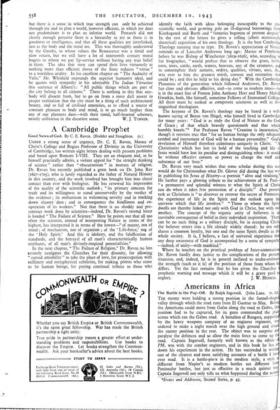Rediscovering Delight
izs. 6d.)
IT is very agreeable to discover a champion of the humanities coming from Oxford after so long and humble a prostration before the gods of Cambridge. Mr. Whitfield, Oxford University Lecturer in Italian, is a fighter in the most respectable academic tradition • he produces facts, and reasons from them without spleen, but with a vivifying intensity that is agreeably ironical ; he is withoui that vice of preferring to amuse rather than to convince ; in other words he is serious, not frivolous, and this is a serious work of scholarship as well as a challenge.
The nineteenth century thought the Renascence—as Mr. Whitfield prefers to Latinise it—wicked, but that had its root in their terror before all joy. Epicurus, pleasure's great philosopher, was anathema in the Middle Ages not only because he denied the soul's im- mortality but because Christianity's power over the princes of the earth _rested wholly on the terrors of the world to come. Even the enlightened Petrarch, as Mr. Whitfield quotes, wrote "Let it be far from me to place not the summum bonum, but. . . any good at all in riches or pleasure," and it is clear from what follows that by " pleasure " Petrarch meant pleasures of the body, not of the mind. This extraordinary narrowness and this lack of respect for the body shows how far even Petrarch's imagination was still in mediaeval chains. To Petrarch, as to Dante, the great Greek and Roman philosophers and poets were damned men, who could only possess a minor virtue, and only in so far as it lacked "elements in conflict with the Christian revelation." Petrarch and his contemporaries read Cicero with a circumspection that is to us comic, and Mr. Whitfield shows a real and lively historical imagination in his ability to be fair to Petrarch, and to make us realise the high degree of Petrarch's sanity and intellectual scepticism. We see Petrarch emerging as an intellectual lighthouse amid the fogs of superstition and credulity of his own time and the centuries before him. This is most plainly shown (and incidentally what humanism essentially stands for) in Petrarch's comment on the mediaeval craze for science:
"So he knows many things about beasts, birds and fishes: how many hairs the lion has on its head, how many feathers a hawk has in its tail, with how many tentacles the octupus binds a ship- wrecked man, how elephants copulate backwards and gestate for two years . . . how the sea-urchin checks the movement of a ship, though taken from the waves it can do nothing ; how hunters deceive tigers with a mirror, &c. . . . These things are for the most part false . . . but finally, even were they true, they have no relevance at all to the blessed life."
We today are in a similar trough of superstition to that of the Middje Ages in the general credulity, among educated and un- educated alike, towards the " sea-urchin " pronouncements of our propaganding scientists. From the biologists' psychological photo- phenomena in infants to the physicists' mathematics of a Divine Astronomer there is poured forth in the writings of popular scientists today a mass of so-called knowledge which is largely hypothetical, never more than partially true, and always of minor relevance to the living of a good, let alone a blessed, life. It is time the artists flung their challenge to' the scientists as Petrarch did, and after him Montaigne, and all the humanists of the Renascence. It is the artists alone who can rescue the conception of "pleasure " from the low state into which Christian mediaevalism, and again nineteenth century morality, debased in " Strength through Joy " as an idea has been corrupted by Nazi distortion, but there is a sense in which true strength can only be achieved through joy and to plan a world, however efficient, in which joy does not predominate is to plan an inferior world. Petrarch did no clearly enough perceive there is a hierarchy in joy as there is in goodness or intelligence, and that all these qualities are interlinked just as the body and the mind are. This was thoroughly understood by the Greeks, to whose values the Renascence was a timid and slow return, but we still have a lot of nineteenth century moral bogeys to whom we pay lip-service without having any true belief in them. The idea that men can spend their lives virtuously as nothing more than efficient slaves of the State reduces " virtue ' to a worthless aridity. In his excellent chapter on "The Audacity of Valla," Mr. Whitfield expounds the superior humanist ideal, and he quotes with sympathy in his admirable The Italian Vitruvius this sentence of Alberti's : "All public things which are part of the city belong to all citizens." There is nothing in this that any- - body will dissent from, but to go on from a mere dull assent to proper realisation that the city must be a thing of such architectural beauty, and so full of civilised amenities, as to afford a source of constant pleasure to body and mind, is to go much further than any of our planners dare—with their timid, half-hearted schemes, mostly utilitarian in the dreariest sense. W. J. TURNER.



























 Previous page
Previous page